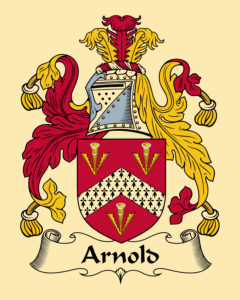
We sell our products exclusively on Amazon so you can buy with confidence knowing you are protected by Amazons no hassle return policy and our 4.9 star lifetime seller rating with over 2000 reviews. Items featuring a family crest make great gifts, whether for yourself or that hard to buy for family member, friend or co-worker.
We also sell customized license plates (add your own image and text). customizable mugs and license plates for military veterans, classic art on mouse pads and posters, a wide variety of flag license plates for nations around the world as well as pride flags and Native American tribal flags. Click here to go to our Amazon Store front.
We sell Mugs, Plaques, Prints, Ceramic Tiles, Coasters, Garden Flags, License Plates and Mouse Pads featuring The Arnold Coat of Arms. Click the image to go to Anglo/Irish names A section of our Amazon store.
Etymology
The surname Arnold has an intriguing history, reflecting the blending of linguistic and cultural influences over the centuries. It is an Anglo-Irish surname with roots tracing back to both Germanic and Old French origins. The name’s etymology, migration, and adaptations over time provide a fascinating insight into the evolution of surnames.
Etymology and Origins
The surname Arnold derives from the Germanic personal name “Arnwald” or “Arnoald,” which is composed of the elements “arn,” meaning “eagle,” and “wald,” meaning “rule” or “power.” This compound suggests a meaning along the lines of “eagle power” or “eagle ruler.” The name Arnold was brought to England by the Normans following the Conquest of 1066, where it was further influenced by Old French, becoming “Arnaut” or “Arnaud.”
In medieval England, surnames began to stabilize, and the name Arnold became established as a family name. It likely originated as a patronymic surname, meaning “son of Arnold.” Over time, it became a hereditary surname, passed down through generations.
Earliest Recorded Use
England: The Arnold surname has early records in England. The Domesday Book of 1086, a comprehensive survey of England ordered by William the Conqueror, lists an “Arnold de Hardenburg” in Sussex. This indicates that the name was present in England shortly after the Norman Conquest. Another early record includes “William Arnold” in the Hundred Rolls of 1273, which further attests to its use in England.
Scotland: In Scotland, the surname Arnold also appears relatively early. Records from the 13th century mention “John Arnold” as a witness in a legal document in 1275. The name may have arrived in Scotland through Norman or English settlers, as Scotland had strong ties with both England and Normandy during this period.
Ireland: The surname Arnold in Ireland is often associated with English and Norman settlers who came during the Norman invasion of Ireland in the late 12th century. While not as common as in England, the name appears in Irish records by the 14th century. The Anglo-Norman presence in Ireland likely facilitated the spread of the surname.
United States: The Arnold surname made its way to the United States during the colonial period. One of the earliest recorded Arnolds in America was William Arnold, who arrived in New England around 1635. He was a founding settler of Providence, Rhode Island, and a prominent figure in early American colonial history. This branch of the Arnold family became well-established in New England.
Spelling Variations
As with many surnames, the spelling of Arnold has varied considerably over time and across regions due to differences in pronunciation, literacy levels, and clerical recording practices. Some common variations include:
Arnoald – Germanic origins, Arnald – An older variation, Arnould – A French variant , Arnoll – A phonetic spelling , Arnaud – French, Arnaut – French, Arnaldus – Latinized version, Arnallt – Wales, Arnel – anglicized form
These variations often arose from differences in dialects and languages, as well as transcription errors in historical documents. Over time, certain forms became standardized, with “Arnold” becoming the most widely accepted and used version in English-speaking countries.
Conclusion
The Arnold surname is a rich example of the cultural and linguistic blending that has shaped family names throughout history. Originating from a Germanic personal name, it was carried across Europe by the Normans and established in England, Scotland, and Ireland. Its journey continued to the United States, where it became a part of the American colonial story. The various spellings and adaptations of the name highlight the diverse influences and historical contexts in which it has been found. Today, Arnold remains a common surname, with a legacy that spans many centuries and continents.